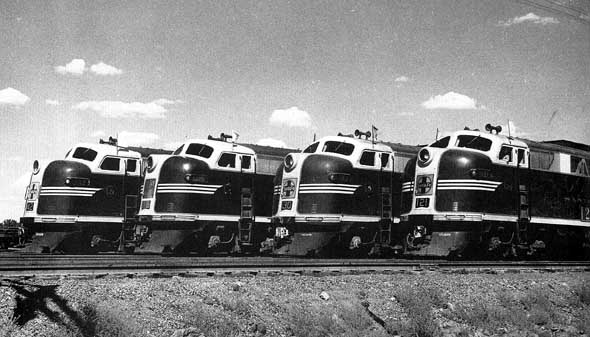Santa Fe Freight FT's |
 Four 100-class FT locomotives pose for the company photographer at Winslow, Arizona just before V-J Day (August 15) in 1945. From left to right, 142C sports a later version of the Santa Fe badge plate (see modeling notes) and a slight difference in the headlight housing. Units 118L, 130L and 121L are all graduates from La Grange class of 1943. -Santa Fe, John McCall Collection |
|
FT's road numbers 100 through 199 and 400 through 430 Electro-Motive's 1939 demonstrator locomotive carried model designation FT, these initials standing for Freight, Twenty-seven hundred horsepower, under EMC's early model designation system. (The 2700 HP stemming from the total HP of an A-B set, EMC's intended sales package for the FT). The FT demonstrator carried road number 103 and did a barnstorming tour of the Santa Fe and many other railroads throughout the country in early 1940 turning in an impressive performance everywhere it went. It was made up of four separate power units of 1350 HP each for a total of 5400 HP, a close equivalent to the HP rating of the most modern steam locomotives of the day including the Santa Fe 's new 3765 class 4-8-4's and 5001 class 2-10-4's. The FT thumbed its nose as it rolled past the water plugs where steam engines were compelled to stop all too frequently. At the end of the run it was just "fill her up and check the oil" and head out on another train instead of a visit to the roundhouse for the labor intensive servicing required by a steam locomotive prior to another run. Santa Fe's management was sufficiently impressed with 103's performance to place an order on October 1, 1940 for production units-the first railroad to do so. Santa Fe's FT deliveries began with two AB sets numbered 100LA (in December 1940) and 101LA (in January 1941), "L" (for lead) units having a cab and "A" being cab-less boosters. Road numbers on 100A and 101LA are said to have been painted out during early operations so that the only visible number on the quartet was on the lead unit number 100. This may have been done because of early rumblings from the labor unions about multiple unit diesel locomotives requiring multiple crews. Santa Fe intended to use their FT's as 4-unit 5400 HP locomotives, so 101LA was quickly renumbered to 100BC, "B" being a cab-less booster and "C" being equipped with a cab. A new A-B-B-A set was built and numbered 101LABC, giving two full A-B-B-A locomotive sets. This very early renumbering was only a small hint of many subsequent renumberings to be inflicted on the 100 class during their service lives. Before any more FT's were delivered, the railroad labor unions confirmed the Santa Fe's fears when they decreed that every cab unit must have a crew even though it was completely unnecessary for the operation of the locomotive. Of course, the railroad was not about to pay a second crew to sit in the cab of a trailing unit and do nothing, so management decided subsequent locomotives would be arranged in A-B-B-B sets rather than A-B-B-A to eliminate having a second cab and changed the first two locomotives to A-B-B-B sets as well. |







